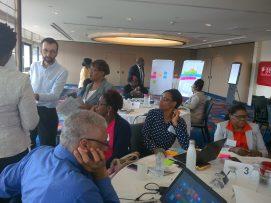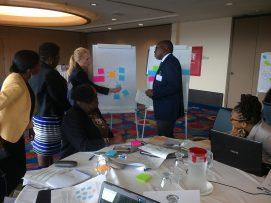Integrated Policies and Policy Coherence for SDG implementation in the Caribbean Small Island Developing States
Workshop: SDGs in the Caribbean Small Island Developing States/ Integrated policies and policy coherence

The workshop was hosted by the Economic Commission for Latin America and the Caribbean (ECLAC) Subregional Headquarters for the Caribbean, from 13-15 November 2019 in Port of Spain, Trinidad and Tobago. Co-organized by UNITAR, UN DESA-Division for Public Institutions and Digital Government (DPIDG), DSDG-SIDS, ECLAC Caribbean. Participants: Senior policy makers and senior planning officials from Antigua and Barbuda, Aruba, Barbados, Belize, British Virgin Islands, Dominica, Grenada, the Grenadines, Guyana, Jamaica, Saint Lucia, Saint Vincent, St. Maarten, Suriname and Trinidad and Tobago.
The broader objective of this workshop was to help to accelerate the implementation of the Sustainable Development Goals (SDGs) in the Caribbean Small Island Developing States (SIDS) by deepening participants’ understanding of specific integrated planning methodologies and raise awareness about the need for taking ownership to bring about changes in institutions.
Policy coherence in support of the achievement of global goals is not a new concept. The 2030 Agenda states that the SDGs are integrated and indivisible, and should balance the economic, social and environmental dimensions of sustainable development. The agenda includes SDG Target 17.14 to enhance policy coherence for sustainable development as an essential means of implementation for all the goals.
According to Voluntary National Reviews, the establishment of processes for policy coherence still presents a major challenge, because it needs policies to be coherent at various levels of government. It as well requires that negative impacts of policies are mitigated while synergies of mutually supportive policies are supported, especially across sectors.
Meaningful Collaboration

The Acting Permanent Secretary of the Ministry of Planning and Development from Trinidad and Tobago, Ric Javed Ali, recognized the timeliness of the workshop, coming amidst the country’s preparation for its first Voluntary National Review in 2020. He highlighted the importance of the engagement of a wide range of stakeholders to achieve the SDGs. He also emphasized the importance to address issues of alignment, institutional coordination and coherence to achieve this. The director of ECLAC Caribbean, Diane Quarless, emphasized that the pursuit of a successful long-term sustainable development strategy requires a strong institutional framework and processes that are based on solid data and evidence to inform national development planning.
Participants also emphasized the requirement for meaningful collaboration and coordination across policy sectors, different levels of government and non-government stakeholders like academia and the private sector.
A Practical Approach

The workshop combined awareness raising, knowledge sharing and capacity building. The concrete sharing of experiences from Belize, Grenada and Jamaica resulted in several lessons learned. For example, the observed gaps as identified through a “readiness assessment for policy coherence” at the country level were in many cases the result of capacity constraints in policy planning.
Moreover, the representatives from the 14 countries recognized the importance of integrating policies across the different sectors of the national development plans, while at the same time attuning the plans to the internationally-agreed development objectives such as the SAMOA Pathway, the Sendai Framework and the Addis Ababa Agenda for Action.
The workshop included a “training of trainers” component which will enable participants to transfer the acquired knowledge and skills.
For more information, and to learn about the Division of Public Institutions and Digital Government, visit DPIDG’s website.